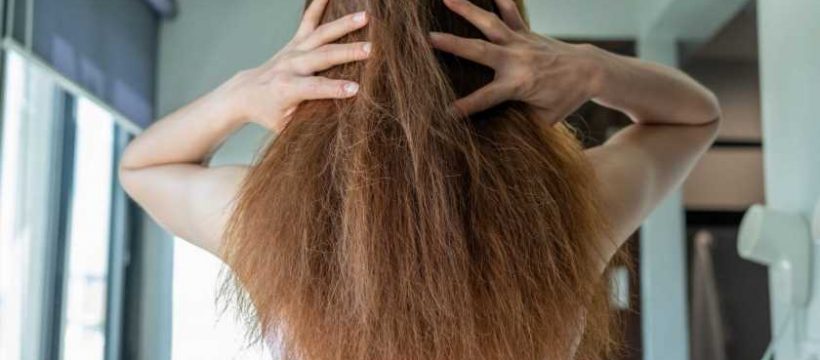From shedding to breakage, the good news is distressing hair changes can be a symptom of treatable health concerns, as Helen Wilson-Beevers found out first hand.
A few changes began happening to my body back in 2018. I’d always been someone who felt the cold, but suddenly even wearing layer upon layer of clothing didn’t keep me warm. Tiredness and brain fog made every day harder, and I’d ache even climbing the stairs. I put it all down to being a busy mum and was too distracted to worry more. Plus, who doesn’t feel worn out by the daily work-life juggle?
But what made me think something could be wrong was after I started noticing gradual changes in my hair: a lack of bounce in my hair, strands seeming less voluminous, and finally, my hair stylist commenting on noticeable dryness – it just felt different. I’d always had fine hair, with postpartum shedding a few years ago being my only reference point for upsetting scalp or strand changes.
You may also like
Exercise and chronic illness: “My autoimmune condition made me appreciate my workouts more than ever”
Heading into 2019, I saw the brittle texture worsen and strands started snapping off. By that summer, I looked sadly at photos of my previously glossy locks and wondered at what point they’d changed so much. My hair was limp, thinner, flat and so damaged I stopped using any heat on it whatsoever. I became increasingly self-conscious and visited my doctor a few times, impressing upon them the stress of being able to see this physical change. To me, it felt like tangible evidence of something happening inside my body, and the distress of that can’t be underestimated.
Several blood tests and a scan later, I found out my thyroid levels were underactive thanks to an auto-immune condition called Hashimoto’s disease. My immune system was misfiring and attacking the thyroid, leaving it unable to work properly.
This small but mighty butterfly-shaped gland in our neck is responsible for regulating the body’s metabolism as well as key organs including the brain and heart. And despite the blood test results being only a bit off what’s classed as ‘normal’, high levels of auto-immune antibodies had caused enough damage for my thyroid to struggle.

How internal health can affect our hair
After starting on the thyroid hormone replacement medication thyroxine, I still wanted to do everything I could to help my damaged ’do. So I visited trichologist and brand president Anabel Kingsley at Philip Kingsley’s London clinic to learn more about how health and hair is inextricably linked.
During a consultation, Kingsley explained to me that as hair is a non-essential tissue, if it is struggling, the body will divert key nutrients that would go to the hair first to power essential organs – which is why these changes had happened. Symptoms of an underactive or overactive thyroid include issues such as thinning, shedding and breakage, but these aren’t the only health conditions to affect hair to such a distressing degree.
Lisa Caddy, a fellow trichologist at Philip Kingsley, tells Stylist: “Hair is the body’s second-fastest dividing cell and so its nutritional needs are demanding. But it goes to the back of the queue priority wise, so if there’s not enough nutrition to go around, this is the first place the body will take it from.”
Low ferritin
Caddy continues: “One of the most common reasons for hair changes we see is low ferritin, which also causes dryness and increased shedding. Ferritin is the body’s iron storage, and low levels are very common among women of menstruating age. While the normal range is classed as between 12-200μg/L, it’s actually not an optimum amount for hair health until ferritin is over 80μg/L.”
Inflammatory conditions
Caddy explains that an underactive thyroid can slow digestion down and create absorption issues: “This is similar to the impact of other inflammatory conditions including Crohn’s, ulcerative colitis and coeliac disease. Because if your body is struggling to absorb key nutrients, your hair won’t be able to thrive at its optimal condition either.”
Vitamin deficiencies
If you’re anaemic, deficient in vitamins such as D or B12 or you aren’t getting enough protein and complex carbohydrates, hair density changes can often be the first way this will present.
Hormonal changes or imbalances
Speaking of that aforementioned postpartum shedding, hormone fluctuations are also responsible for hair changes whether you’re experiencing an imbalance due to PCOS, perimenopause or certain types of contraceptive pills, as well as spiking cortisol levels.
When to seek help after noticing hair changes
Shedding
If you’re seeing too many strands coming out when handling your hair, that’s classed as ‘shedding’. There are often temporary reasons for this including stressful life events, illness and viruses like Covid. Because of the hair cycle, it usually kicks in anywhere between eight-to-12 weeks after that initial trigger.
Caddy adds: “It’s undoubtedly an alarming and upsetting occurrence to lose hair, and in this case, the shedding can go on for up to 16 weeks. However, a temporary shed will settle and regrowth occurs, so if hair loss continues for more than four months it’s best to seek help from your GP or a trichologist to pinpoint the reason.”
Hair loss or gradual thinning
Sudden hair loss is different to gradual hair thinning and if long-term condition changes are bothering you, it’s worth investigating whether any deficiencies are playing a part. As well as visiting the GP for blood tests, this can be done at home by ordering a finger prick kit from companies such as Thriva or Medichecks. If you choose the latter, still make an appointment with your GP so that you can share the results and seek guidance.
A couple of years on from diagnosis and my hair health is far better, although I’ve developed a keen eye for spotting any dryness or potential deficiencies. The bottom line is, if you’re experiencing persistent, ongoing strand changes and your hair feels fundamentally different, remember to trust that you know your hair (and body) best.
Images: Stylist
Source: Read Full Article
